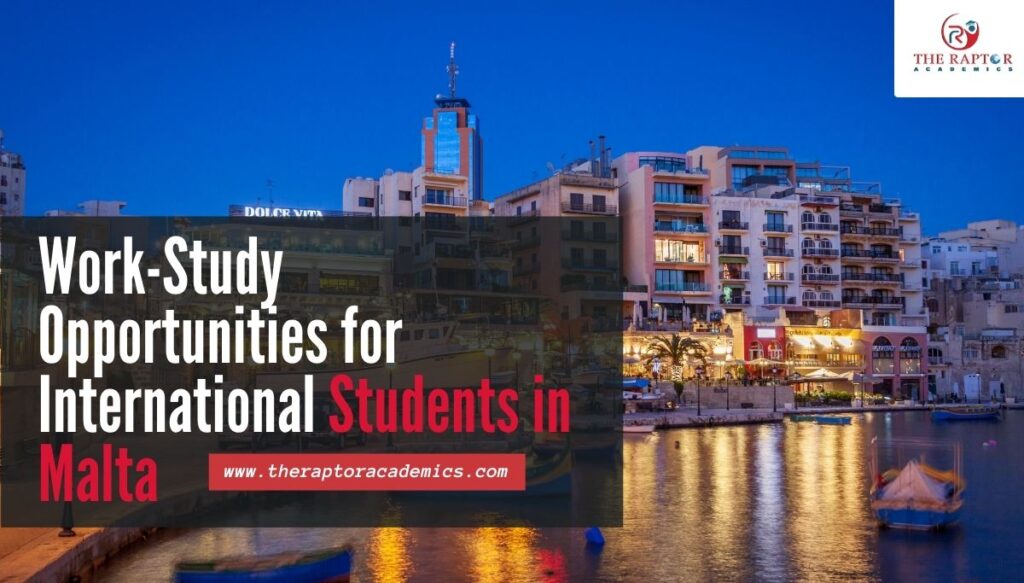Dreaming of studying abroad while gaining international work experience? Malta, a gem in the heart of the Mediterranean, is quickly rising as one of the top destinations for Indian students — not just for its world-class education but also for the chance to work while you study.
With English as an official language, affordable living costs, and a welcoming environment, Malta is a place where you don’t just earn a degree — you build a future. Plus, being part of the Schengen Zone, a Malta student visa gives you access to travel freely across 29 European countries, opening doors to global exposure and cross-cultural experiences.
Beyond the classroom, Malta offers international students legal work opportunities, allowing you to earn part-time, gain hands-on experience, and manage your expenses. Whether it’s a weekend café job in Valletta, a summer internship with a tech company, or a role in Malta’s booming hospitality industry — your education becomes even more valuable when it’s paired with real-world skills.
Can International Students Work While Studying in Malta?
Yes, absolutely! Malta offers international students the opportunity to work legally while pursuing their education, making it a top choice for those looking to support themselves financially and gain real-world experience. However, there are some key requirements to be eligible:
- You must reside in Malta for at least 90 days before applying for a work permit.
- Your course should be longer than 90 days and must be offered by an accredited institution recognized by the Maltese government.
- Once eligible, you can apply for an Employment License through your employer, facilitated by Identity Malta.
This opportunity not only eases your living expenses but also boosts your resume with international work exposure — a win-win for every student!
Work Hour Limitations for Students
International students in Malta must adhere to certain regulations regarding work hours to ensure their academics remain a top priority. According to Maltese labor laws:
- Students are allowed to work up to 20 hours per week during regular academic sessions.
- During semester breaks and holidays, students may work full-time — usually up to 40 hours a week, provided they have approval from their employer and the proper work documentation.
This flexible arrangement ensures students can balance their studies with part-time work, helping them manage living costs, gain practical experience, and immerse themselves in the local workforce without compromising academic performance.
Types of Part-Time Jobs Available
Malta’s thriving tourism and service industry provides international students with plenty of part-time job opportunities that fit well around study schedules. Whether you’re looking to earn extra income or gain work experience, here are some common roles:
- Retail Assistants: Work in local malls, fashion outlets, or convenience stores.
- Food & Beverage Staff: Waiting tables, kitchen help, or baristas in cafes and restaurants.
- Hotel and Tourism Roles: Receptionists, tour guides, and housekeeping — especially in hotspots like Valletta, Sliema, and St. Julian’s.
- Customer Support: Many international companies in Malta hire English-speaking students for part-time support roles.
- Internships & University Jobs: Admin support, student ambassador roles, or internships in startups and academic departments.
Having good English communication skills and a basic understanding of customer service can make you a preferred candidate in Malta’s job market.
Also Read: Best Highest Paying Part-Time Jobs for Students in Malta [2025]
How to Find a Work-Study Opportunities in Malta as a Student
Looking for part-time work in Malta? Here are some practical and proven ways to get hired quickly:
- University Career Centers: Most Maltese universities have dedicated departments to help students find internships and part-time jobs.
- Online Job Portals: Use platforms like Jobsinmalta.com, Keepmeposted, and CareerJet Malta.
- Networking: Connect with student groups, attend local events, and talk to seniors or alumni who’ve already navigated the job scene.
- Walk-in Applications: Malta still values a personal touch — handing your CV directly to cafes, restaurants, and shops can often lead to interviews on the spot.
Persistence, politeness, and preparedness are key to securing your first role in Malta.
Work Permits and Residence Requirements
While Malta allows international students to work, there are some legal formalities you must follow:
- First, obtain a Student Residence Permit from the Identity Malta Agency. This is mandatory for all non-EU international students.
- After residing in Malta for 90 consecutive days, you become eligible to apply for an Employment License through Jobsplus, Malta’s national employment agency.
- This license is employer-specific — if you wish to change jobs, you’ll need to apply for a new license.
Navigating these legal steps might seem complex, but don’t worry — The Raptor Academics can assist you throughout the process, ensuring you meet all requirements and deadlines for both study and work permits.
Benefits of Working While Studying in Malta
Working while studying in Malta isn’t just about earning some extra cash — it’s a gateway to deeper integration into Maltese society and professional life. Here’s how students benefit:
Financial Independence: Cover part of your living expenses such as rent, food, transport, or even weekend getaways — without relying entirely on family or savings.
Cultural Exposure: Through everyday interactions at work, you get to experience Maltese values, customs, and lifestyle up close.
Skill Development: Gain soft skills like communication, teamwork, and time management — plus you’ll add valuable international experience to your resume.
Job Market Entry: Many part-time roles turn into long-term opportunities. Building professional connections early can pave the way for a full-time career in Malta after graduation.
Working in Malta as a student is both empowering and enriching — personally, culturally, and professionally.
Post-Study Work Options
After completing your studies, Malta offers a clear path for those who want to transition from student life to a professional career. Graduates can apply for a 12-month post-study work visa, which allows them to remain in Malta and seek full-time employment.
This extension gives you the time and flexibility to explore job opportunities in your field, especially in industries like hospitality, gaming, finance, healthcare, and IT. It’s also a critical step for those who eventually want to apply for PR in Malta, as work experience and continuous legal stay are key eligibility factors.
Whether you’re aiming to gain work experience, apply for a work permit, or even settle long-term — this post-study period is your launchpad to success in Malta.
Conclusion
Working while studying in Malta is not just a financial lifeline—it’s a gateway to career growth, personal development, and long-term settlement opportunities. With the right planning and support, you can make the most of this vibrant student-work ecosystem.
Need help finding a university, preparing documents, or securing part-time work in Malta? Let The Raptor Academics guide you through your academic and professional journey abroad.
FAQs
1. Can I work while studying in Malta as an Indian student?
Yes, international students including Indians can work part-time in Malta after staying for 90 days, provided their course exceeds 90 days and they hold a valid student residence permit.
2. How many hours can I work as a student in Malta?
Students can legally work up to 20 hours per week during academic sessions and full-time during official holidays.
3. Do I need a work permit to get a job in Malta as a student?
Yes, students must apply for an Employment License from Jobsplus after 90 days of residence in Malta.
4. What kind of jobs can students do in Malta?
Popular student jobs include roles in retail, restaurants, tourism, administrative work, and internships within companies or universities.
5. Can I stay in Malta after graduation to work full-time?
Yes, Malta offers a 12-month post-study work visa, allowing graduates to find full-time jobs and transition to long-term residence.




